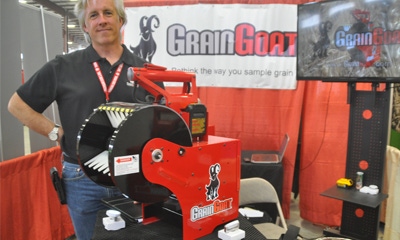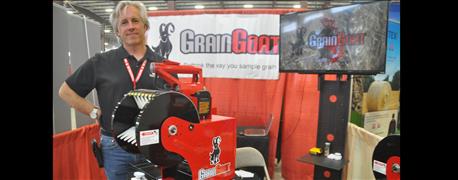
You've seen combines and mini-combines intended for harvesting small parcels such as demonstration plots. Now meet the GrainGoat, the smallest combine you can imagine.
GrainGoat is not much larger than a backpack and can be hand-carried into the field. It runs on rechargeable battery power, and its stripper head operates either at slow speed or high speed, controlled by the operator with the push of a button.

GRAINGOAT: Farmer/inventor Martin Bremmer brought his GrainGoat to the 3i Show in October. He plans to exhibit at the Wichita Farm and Ranch Show and the McCook, Neb., Farm and Ranch Show in November.
Its inventor, Martin Bremmer, is a Nebraska farmer who, like many of his colleagues around the country, saw a need for a product and decided to build it. He started development three years ago and has been tweaking it ever since with some help from researchers at the University of Nebraska and funding from the USDA through the Small Business Innovation Research program.
This summer, the GrainGoat hit the market, and Bremmer brought it to the 3i Show in October to introduce it to potential customers.
"This is designed primarily to be a machine you can use to collect a sample from any field and test it for moisture to see if it is dry enough to harvest," Bremmer says.
The unit includes a combine stripper head that takes off just the heads of a small-grain crop such as wheat or milo, and a collection bin with a moisture sensor.
He says there are 500,000 small-grain growers farming 56 million acres in the U.S. who could potentially benefit from the machine. Around the world, there are 3 million.
He says that a 2,000-acre wheat field can lose up to $2,600 a day if not harvested at optimum moisture.
Bremmer and his wife, Patti, have started Windcall Manufacturing based in Venango, Neb., to assemble the machine. The 65 parts that comprise the machine are custom-made for Windcall under contract.
Bremmer says his goal is to ship completed GrainGoat machines to domestic and export customers.
"We have a modified version that we hope to market to seed breeders and researchers," he says.
The GrainGoat is a semifinalist in the Farm Bureau Rural Entrepreneurship Challenge and will compete for the top award during the Farm Bureau Annual Convention in Phoenix in January.
"We have seen a lot of interest from custom cutters," Bremmer says. "It can be really time-consuming and cost a lot of money to figure out which fields are ready to cut and which need a few more days. Moving full-sized machinery is cumbersome and expensive. If you get into the field and find out that it's too wet, then you have to stop, move all the equipment out and move to another field."
In addition to wasting time, the process costs money. Depreciation on a combine is $120 per engine hour and moving a combine down a road or highway is a slow process.
A GrainGoat, on the other hand, can be transported in a pickup truck and taken from field to field to collect samples. Collecting and testing the sample takes only a few minutes and allows crews to schedule the fields in the order that's best for optimum harvest moisture.
The GrainGoat sells for about $2,000 and will pay for itself in a half-season for custom harvesters or about two seasons for farmers, Bremmer says.
He adds that the GrainGoat has been tested on wheat, grain sorghum, barley, oats and field peas. He has plans to test it on rice and soybeans as well.
"Right now, it seems the most useful for small-grain crops. Obviously, it will not work on corn," he says.
Bremmer says he has been traveling to trade shows to demonstrate the GrainGoat.
"It is an educational effort right now," he says. "I have enlisted the aid of Extension agents to help explain its usefulness to farmers. Sometimes it can be hard to get farmers to change the habits that have been ingrained over the years. Extension can be very helpful with that."
Bremmer plans to exhibit the GrainGoat at the Wichita Farm and Ranch Show Nov. 8-10 and at the McCook Farm and Ranch Show in McCook, Neb., Nov. 16 and 17, as well as the U.S. Custom Harvesters Conference and Trade Show in Omaha in January.
About the Author(s)
You May Also Like




